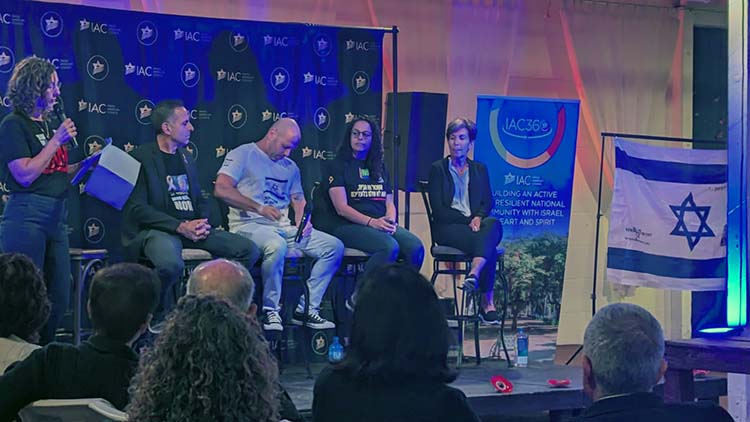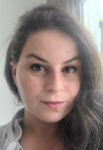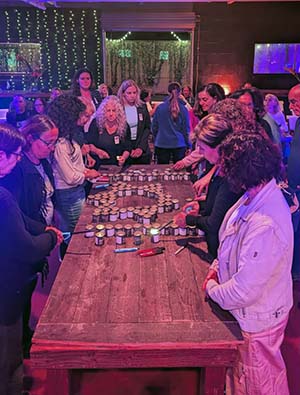
Story by Miriam Gershenson; Photos by Albert Kreimerman


SAN DIEGO – In the aftermath of the horrific events of October 7th, 2023, the power of personal stories has emerged as a vital tool for understanding and healing. During a gathering on Tuesday, Oct. 22, put together by the Israeli American Council (IAC), a group of people came together to share their experiences.
These stories, spoken with raw emotion and courage, offered a window into the profound loss and resilience of a community forever changed by the tragedy. As voices broke and tears were shed, the room was united not only in grief but also in the hope that these memories would ensure the lives taken would never be forgotten.

The event started with songs both live and video as well as with Noy Finanser, IAC Regional Director, saying a few words and welcoming people to light a memorial candle. Community members got up and lit the candles that were arranged in a Star of David shape. There were pens and markers on the table for people to be able to write a name on the candle. I was one of the people who lit a candle and I wrote Daniel Ben Senior on my candle.
Inbal Manor Tamari came on the stage as she was gearing up to moderate the panel. The panel consisted of Rotem Cooper, Ayelet Shachori Vagim, Ofir Ganot, and Mira Pessah. Each person had a chance to tell their story. It started with Mira Pessah who told us the story of her nephew, Yair Yaakov who was also known as Yaya. On October 7th, Yaya, his partner, and the two children were kidnapped. Thankfully, his partner and two children returned after spending 53 days in captivity. Unfortunately, Yaya did not have the same fortune as he was murdered.
Next, Ayalet Shachori Vagim, who grew up in Kibbutz Nir Yitzhak told us that when she heard that there was a group of terrorists, she imagined two and up to maybe five. She never imagined it would be hundreds of them. Her brother- in – law, Yaron Shachar, who was the security officer of the kibbutz, was killed.
Then Ofir Ganot told the story of his brother, Deputy Superintendent Dan Ganot. He was one of the first officers to arrive in Be’eri Unfortunately, Dan was killed while attempting to protect. Ofir told us about beating the odds when he came to an event in San Diego and randomly met a man who knew his brother. He told us that through people, he is learning so much about his brother that he did not know.
Last, and certainly not least, Rotem Cooper spoke. Rotem is from Kibbutz Nir Oz. This Kibbutz had over 110 residents murdered or kidnapped. This includes his parents, Amiram and Nurit Cooper. After 17 days in captivity, Nurit was released. After four months in captivity, Amiram was murdered. His body is still being held in Gaza. The Cooper family has ties to San Diego as both Rotem and Dalia Cooper live here. Dalia was in attendance and read a tearful poem.
After hearing the stories of these individuals, the floor was opened to questions. I wanted to ask questions but frankly, I couldn’t bring myself to do so. However, others were braver than I and asked their questions that ranged from clarifying details to the panel’s thoughts on politics after the elimination of Sinwar. I was amazed at how functional the panel was and how open they were in answering the crowd’s questions.
As the event drew to a close, the weight of the shared stories lingered in the air, a poignant reminder of the human toll behind the headlines. Each story brought to life the unique pain and resilience of those left behind, yet also underscored the strength of a community that refuses to be broken by tragedy. The courage displayed by the panelists and the audience, in their vulnerability and willingness to share, brought a sense of unity and collective healing.
This gathering was more than just a memorial—it was a testament to the enduring power of memory and a call to never forget the lives lost and the families still waiting for justice. As we move forward, it is through these stories, spoken aloud and carried in our hearts, that we honor the victims and ensure that their legacies continue to live on.
*
Miriam Gershenson and Albert Kreimerman are wife and husband, respectively freelance writer and freelance photographer.